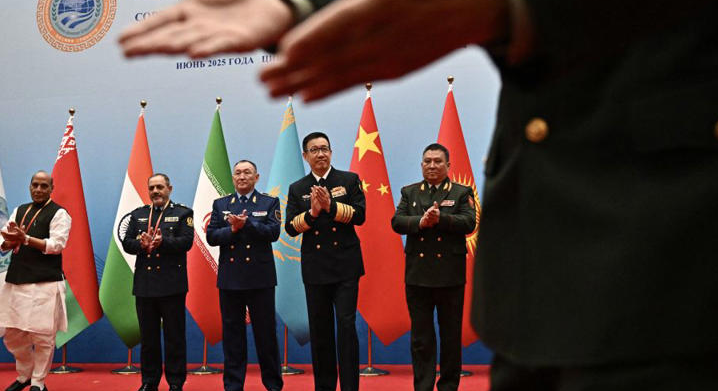
Iran’s Defense Minister Visits China in First Known Trip Since Tensions with Israel
For the first time since a 12-day battle with Israel that momentarily drew the United States into a new regional crisis, Iran’s defence minister has visited diplomatic and economic partner China.
According to Chinese state media, Aziz Nasirzadeh was one of nine defence ministers who attended a meeting of the Shanghai Cooperation Organisation (SCO), a regional security organisation led by China and Russia that has gained prominence as Beijing and Moscow seek to create alternative international blocs to those supported by the United States.
A ceasefire between Iran and Israel ended days of aerial attacks between the two countries, which were interspersed with a US strike on three Iranian nuclear facilities. The two-day meeting started Wednesday in the Chinese coastal city of Qingdao.
At a NATO leaders’ summit in The Hague, which took place concurrently with the SCO meeting, US President Donald Trump announced that the US would meet with Iran “next week” to discuss a possible nuclear deal.
The event, which was organised by Beijing as part of its rotating SCO chairmanship, highlighted the significance Tehran places on its ties with Beijing and China’s position as a major global player despite its relatively passive involvement in the Israel-Iran conflict.
According to Chinese official media, Chinese Defence Minister Dong Jun made statements to a group of nations on Wednesday that did not specifically address the war. Instead, he sought to establish China as a nation with a different approach to international security.
“Hegemonic, high-handed, and bullying acts seriously undermine the international order, making these practices the biggest sources of chaos and harm,” Dong stated, using terminology Beijing frequently uses to attack the US. “Unilateralism and protectionism are on the rise.”
In addition to China and Russia, the SCO countries are India, Iran, Pakistan, Kazakhstan, Kyrgyzstan, Tajikistan, Uzbekistan, and Belarus. The Chinese defence minister called on them to improve coordination, “defend international fairness and justice,” and “uphold global strategic stability.”
According to China’s official news agency Xinhua, participating nations “expressed a strong willingness to consolidate and develop military collaboration.”
Additionally, Xinhua said that Iran’s Nasirzadeh “expressed gratitude to China for its understanding and support of Iran’s legitimate stance.”
According to reports, the minister expressed his hope that China will continue to enforce the rule of law and do even more to preserve the existing truce and reduce tensions in the region.
Chinese officials have denounced the US bombardment that followed Israel’s historic June 13 raid on Iran, which killed top military officers and ignited the current war. Washington’s entry into the war has been denounced as a “heavy blow to the international nuclear non-proliferation regime” and a ceasefire has been supported.
Beijing, Iran’s main economic and diplomatic ally, has taken steps in recent years to strengthen ties, such as conducting joint naval exercises. Chinese authorities have long expressed disapproval of US sanctions against Iran and the US’s decision to withdraw from the 2015 Iran nuclear agreement.
Despite not including purchases of Iranian oil in its official customs data since 2022, analysts say China is still by far Iran’s biggest energy buyer. According to CNN, Iran has recently received deliveries of chemicals manufactured in China that are used to make rocket fuel.
Analysts claim that China has shown no desire to further engage in the war beyond its diplomatic efforts in recent days, instead taking advantage of the occasion to further portray the US as an unstable power and itself as a responsible global actor.
“China is willing to work with all parties to play a constructive role in maintaining peace and stability in the Middle East,” Zhang Xiaogang, the spokesman for the Chinese Defence Ministry, told CNN during a routine press briefing on Thursday when asked if Beijing would consider giving Iran material military support as a member of the SCO.
In order to fight terrorism and advance border security, China, Russia, Kazakhstan, Kyrgyzstan, Tajikistan, and Uzbekistan formed the SCO in 2001. Since then, it has expanded in tandem with Beijing and Moscow’s mutual desire to rebel against a US alliance system that they perceive as repressing them.
The group claims to want to “make joint efforts to maintain and ensure peace, security, and stability in the region,” even though it is not an alliance.
However, the SCO has long been perceived as being constrained by conflicts and conflicting interests among its members, such as China and India, which have long-standing border disputes, and Pakistan and India, which fought a bloody war earlier this year.
The first time an Indian defence chief has visited China since a deadly border incident in 2020, Indian Defence Minister Rajnath Singh also attended the Qingdao meeting.


